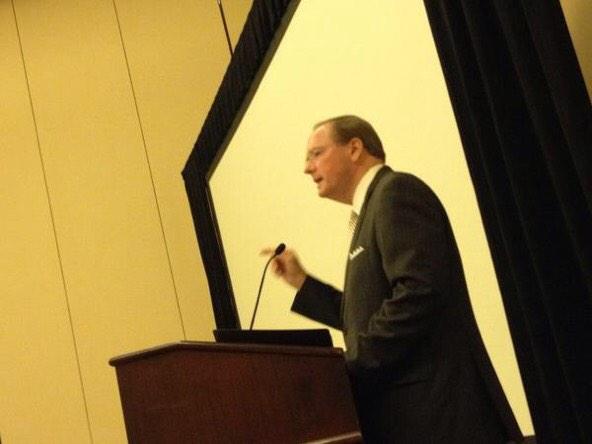Contact: Allison Matthews

Photo by: USDA
ORLANDO, Florida, -- Mississippi State University President Mark E. Keenum delivered the 2014 Seaman A. Knapp Memorial Lecture in memory of "The Father of Extension," Sunday [Nov. 2] in Orlando, Florida, at the annual meeting of the Association of Public and Land-grant Universities (APLU).
Keenum's lecture focused on the historic and future role of Cooperative Extension in helping producers, consumers, families and communities find science-based solutions to the challenges they face.
"We can look back with pride and satisfaction on what Extension has accomplished during its first century," Keenum said. "And while we can scarcely guess what the world of 100 years hence will look like, we can have considerable confidence that a system of helping people learn by doing where they live and work can make it a better place."
The Seaman A. Knapp Lecture is one of three rotating lectures presented by the APLU and U.S. Department of Agriculture's National Institute of Food and Agriculture (NIFA) honoring three historic Land-Grant University figures: Seaman A. Knapp, Justin Smith Morrill, and William Henry Hatch. Nominations for this prestigious award are submitted by land-grant universities, stakeholders, foundations, public interest groups and international organizations.
Keenum discussed how American universities, and land-grant institutions in particular, are well equipped to help governments, international organizations, the private business sector, and nongovernmental organizations in addressing pervasive global problems such as vitamin deficiencies, access to clean water, hunger and malnutrition.
"We have only scratched the surface of what research, extension and teaching at academic institutions will be able to contribute in the fight against world hunger in the years ahead, improving the health, safety and security of millions," Keenum said. "Our challenge is to bring our resources to bear on critical global issues. One of the greatest tools at our disposal is the Extension model," he added.
Knapp's success as a national leader of the Farm and Home Demonstration System helped bring about the Smith-Lever Act of 1914, which resulted in the creation of the Cooperative Extension Service in every state.
"As we celebrate the centennial of the Smith-Lever Act, it is only fitting that this year's Knapp lecturer began his distinguished career in the Extension Service and has remained an ardent supporter of agriculture in the United States," said Sonny Ramaswamy, director of NIFA.
Keenum became the 19th president of MSU on Jan. 5, 2009, and has guided Mississippi State to new heights during his first five years in office. His quick action to address budget shortfalls following the recession that began in 2008 put the university in position to meet those challenges and maintain the highest level of academic excellence. Since then, the university has experienced record enrollment growth to more than 20,000 students. Mississippi State has strengthened its role as the flagship research university in the state, and Keenum has made global food security a university research priority during his tenure at MSU.
Keenum is a graduate of MSU with degrees in agricultural economics, and he began his career at MSU as a faculty member with the Extension Service and the Department of Agricultural Economics, where his primary research and extension work focused on the marketing and economics of aquaculture, specialty crops and forestry. He went on to serve as chief of staff to U.S. Senator Thad Cochran in Washington, D.C. and was Under Secretary of the United States Department of Agriculture prior to returning home to Mississippi State.
Through federal funding and leadership for research, education and Extension programs, NIFA focuses on investing in science and solving critical issues impacting people's daily lives and the nation's future. More information is available at www.nifa.usda.gov.
To read Keenum's speech, click here.